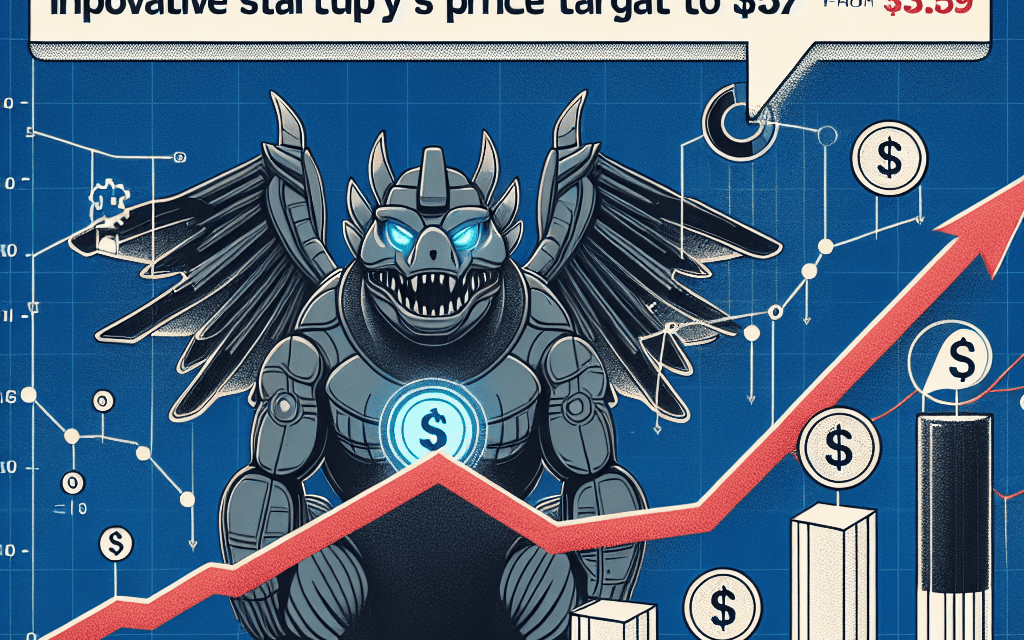“Rising Prospects: Citi Elevates Upstart’s Target to $56, Signaling Strong Growth Potential!”
Introduction
Citi has recently revised its price target for Upstart Holdings, Inc., raising it from $33 to $56. This adjustment reflects Citi’s updated analysis and outlook on Upstart’s financial performance and market potential. Upstart, a leading artificial intelligence lending platform, has been gaining attention for its innovative approach to credit assessment, leveraging AI to improve access to affordable credit. The increased price target suggests a more optimistic view of Upstart’s growth prospects and its ability to capitalize on expanding opportunities within the financial technology sector. This move by Citi indicates confidence in Upstart’s strategic direction and its potential to deliver enhanced value to shareholders.
Impact Of Citi’s Price Target Increase On Upstart’s Market Performance
Citi’s recent decision to increase the price target for Upstart Holdings, Inc. from $33 to $56 has generated significant interest among investors and market analysts. This adjustment reflects a growing confidence in Upstart’s business model and its potential for future growth. As a leading financial technology company, Upstart has been at the forefront of leveraging artificial intelligence to enhance the lending process, thereby offering a more efficient and inclusive approach to credit assessment. The revised price target by Citi underscores the market’s recognition of Upstart’s innovative capabilities and its expanding role in the financial sector.
The impact of Citi’s price target increase on Upstart’s market performance is multifaceted. Firstly, such a substantial upward revision often serves as a catalyst for investor optimism, potentially leading to increased demand for the company’s shares. This heightened interest can drive up the stock price, reflecting the market’s positive sentiment towards Upstart’s future prospects. Moreover, the endorsement from a reputable financial institution like Citi can enhance Upstart’s credibility, attracting both institutional and retail investors who may have previously been hesitant.
In addition to boosting investor confidence, the increased price target may also influence the strategic decisions of Upstart’s management. With a higher valuation, the company might find it easier to raise capital, either through equity offerings or debt financing, to fund its expansion plans. This financial flexibility can enable Upstart to invest in research and development, explore new markets, and enhance its technological infrastructure, thereby strengthening its competitive position in the fintech industry.
Furthermore, Citi’s revised price target could have implications for Upstart’s partnerships and collaborations. As a company that relies on strategic alliances with banks and credit unions to extend its reach, a higher market valuation can enhance Upstart’s bargaining power in negotiations. Potential partners may view the company as a more attractive collaborator, given its perceived stability and growth potential. This could lead to more favorable terms in partnership agreements, ultimately benefiting Upstart’s operational and financial performance.
However, it is important to consider the broader market context in which this price target increase occurs. The fintech sector is characterized by rapid technological advancements and evolving regulatory landscapes, which can pose both opportunities and challenges for companies like Upstart. While Citi’s revised target reflects optimism about Upstart’s ability to navigate these dynamics, it also underscores the need for the company to remain agile and responsive to changes in the market environment.
Moreover, investors should be mindful of the inherent risks associated with stock price target revisions. While an increased target can signal positive expectations, it does not guarantee future performance. Market conditions, competitive pressures, and unforeseen events can all influence a company’s trajectory, potentially leading to deviations from analyst projections. Therefore, while Citi’s price target increase is a positive development for Upstart, it should be considered as one of many factors in a comprehensive investment decision-making process.
In conclusion, Citi’s decision to raise Upstart’s price target from $33 to $56 is a significant endorsement of the company’s growth potential and strategic direction. This development is likely to enhance investor confidence, provide Upstart with greater financial flexibility, and strengthen its position in the fintech industry. However, as with any investment, it is crucial for stakeholders to remain vigilant and consider the broader market dynamics that could impact Upstart’s future performance.
Analyzing The Reasons Behind Citi’s Upstart Price Target Adjustment
Citi’s recent decision to increase the price target for Upstart Holdings, Inc. from $33 to $56 has garnered significant attention from investors and market analysts alike. This adjustment reflects a growing confidence in Upstart’s business model and its potential for future growth. To understand the rationale behind this upward revision, it is essential to delve into the factors that have influenced Citi’s assessment and the broader implications for the financial technology sector.
First and foremost, Upstart’s innovative approach to lending has been a key driver of its success. By leveraging artificial intelligence and machine learning, Upstart has developed a platform that assesses creditworthiness more accurately than traditional methods. This technology-driven model allows for a more inclusive lending process, enabling individuals with limited credit histories to access loans. As a result, Upstart has been able to tap into a previously underserved market, thereby expanding its customer base and revenue streams. Citi’s increased price target likely reflects the bank’s recognition of Upstart’s ability to disrupt the conventional lending landscape and capture a significant share of the market.
Moreover, Upstart’s recent financial performance has been impressive, further justifying Citi’s optimistic outlook. The company has reported strong revenue growth, driven by an increase in loan originations and partnerships with financial institutions. These partnerships are crucial, as they enable Upstart to scale its operations and reach a wider audience. By collaborating with banks and credit unions, Upstart can offer its AI-driven lending platform to a broader range of customers, thereby enhancing its market presence. Citi’s revised price target may be an acknowledgment of Upstart’s successful execution of its growth strategy and its potential to sustain this momentum in the coming years.
In addition to its robust financial performance, Upstart’s strategic initiatives have also played a role in Citi’s decision to adjust its price target. The company has been actively expanding its product offerings, venturing into new areas such as auto loans and small business lending. This diversification not only broadens Upstart’s revenue base but also mitigates risks associated with reliance on a single product line. By entering these new markets, Upstart is positioning itself as a comprehensive financial technology provider, capable of addressing various consumer needs. Citi’s increased price target may reflect confidence in Upstart’s ability to successfully execute these strategic initiatives and capitalize on emerging opportunities.
Furthermore, the broader economic environment has likely influenced Citi’s assessment of Upstart’s prospects. As the global economy continues to recover from the impacts of the COVID-19 pandemic, consumer demand for credit is expected to rise. This trend presents a favorable backdrop for Upstart, as its platform is well-suited to meet the evolving needs of borrowers. Additionally, the increasing adoption of digital financial services is likely to benefit Upstart, as more consumers and institutions embrace technology-driven solutions. Citi’s revised price target may be indicative of its belief that Upstart is well-positioned to thrive in this dynamic environment.
In conclusion, Citi’s decision to raise Upstart’s price target from $33 to $56 is underpinned by several factors, including the company’s innovative lending model, strong financial performance, strategic initiatives, and favorable economic conditions. As Upstart continues to expand its market presence and diversify its product offerings, it is poised to capitalize on the growing demand for digital financial services. Consequently, Citi’s revised price target reflects a positive outlook for Upstart’s future growth and its potential to deliver value to investors.
Investor Reactions To Citi’s Revised Upstart Price Target
Citi’s recent decision to increase the price target for Upstart Holdings, Inc. from $33 to $56 has sparked considerable interest and discussion among investors and market analysts. This adjustment reflects a significant shift in the financial institution’s outlook on the company, suggesting a more optimistic view of Upstart’s future performance and potential for growth. As investors digest this news, it is essential to understand the factors that may have influenced Citi’s revised price target and the broader implications for the market.
To begin with, Upstart Holdings, a leading artificial intelligence (AI) lending platform, has been gaining traction in the financial technology sector. The company’s innovative approach to credit assessment, which leverages AI to evaluate potential borrowers, has set it apart from traditional lending models. This technology-driven strategy not only enhances the accuracy of credit risk assessment but also expands access to credit for underserved populations. Consequently, Upstart’s business model has attracted attention from investors seeking opportunities in the rapidly evolving fintech landscape.
Citi’s decision to raise the price target for Upstart likely stems from several key developments. Firstly, Upstart’s recent financial performance has been robust, with the company reporting strong revenue growth and improved profitability. This positive trajectory indicates that Upstart’s AI-driven lending platform is resonating well with both consumers and financial institutions. Additionally, the company’s strategic partnerships with banks and credit unions have expanded its reach and customer base, further solidifying its position in the market.
Moreover, the broader economic environment may have also played a role in Citi’s revised outlook. As the global economy continues to recover from the impacts of the COVID-19 pandemic, there is an increasing demand for innovative financial solutions that can adapt to changing consumer needs. Upstart’s ability to provide a seamless and efficient lending experience positions it well to capitalize on this trend. Furthermore, the ongoing digital transformation in the financial services industry underscores the importance of AI and machine learning technologies, which are at the core of Upstart’s operations.
In light of these factors, investors are now reevaluating their positions on Upstart, considering the potential for substantial returns. The increased price target from Citi serves as a vote of confidence in Upstart’s business model and growth prospects, prompting some investors to take a more bullish stance on the stock. However, it is important to note that investing in technology-driven companies like Upstart carries inherent risks, including regulatory challenges and market competition. As such, investors must weigh these risks against the potential rewards when making investment decisions.
Furthermore, Citi’s revised price target may influence the broader market perception of the fintech sector. As one of the leading financial institutions, Citi’s analysis and projections are closely watched by market participants. A positive outlook on Upstart could lead to increased interest in other fintech companies, as investors seek to identify similar opportunities within the industry. This ripple effect could drive further investment and innovation in the sector, ultimately benefiting consumers and businesses alike.
In conclusion, Citi’s decision to increase Upstart’s price target from $33 to $56 has generated significant interest among investors, highlighting the company’s strong performance and growth potential. As the fintech landscape continues to evolve, Upstart’s AI-driven approach to lending positions it as a key player in the industry. While the revised price target presents an optimistic view, investors must carefully consider the associated risks and broader market dynamics when evaluating their investment strategies.
Comparing Upstart’s New Price Target With Industry Peers

Citi’s recent decision to increase Upstart’s price target from $33 to $56 has sparked considerable interest among investors and industry analysts alike. This adjustment reflects a growing confidence in Upstart’s business model and its potential for future growth. To better understand the implications of this new price target, it is essential to compare Upstart’s valuation with that of its industry peers. By doing so, we can gain insights into the competitive landscape and the factors driving Upstart’s upward trajectory.
Upstart, a leading artificial intelligence (AI) lending platform, has distinguished itself by leveraging machine learning algorithms to assess creditworthiness. This innovative approach has allowed the company to offer more inclusive lending solutions, thereby expanding its customer base. As a result, Upstart has experienced significant growth in recent years, which is now being recognized by Citi’s revised price target. However, to fully appreciate this development, it is crucial to examine how Upstart’s valuation compares to other companies in the fintech sector.
When evaluating Upstart’s new price target, it is important to consider the performance of its closest competitors. Companies such as LendingClub, SoFi, and Affirm have also made strides in the fintech space, each with its unique approach to digital lending. LendingClub, for instance, has focused on peer-to-peer lending, while SoFi has diversified its offerings to include personal loans, mortgages, and investment products. Affirm, on the other hand, has carved out a niche in the buy-now-pay-later market. Despite these differences, all these companies share a common goal: to disrupt traditional banking models and provide more accessible financial services.
In comparing Upstart’s valuation with its peers, one must consider several key metrics, including revenue growth, market share, and profitability. Upstart’s revenue growth has been impressive, driven by its ability to attract a diverse range of borrowers and lenders. This growth trajectory is a critical factor in Citi’s decision to raise the price target. Moreover, Upstart’s market share in the AI-driven lending space continues to expand, further solidifying its position as a leader in the industry.
Profitability is another crucial aspect to consider when comparing Upstart with its peers. While many fintech companies have struggled to achieve profitability, Upstart has demonstrated a clear path to sustainable earnings. This financial stability is likely a contributing factor to Citi’s increased confidence in the company’s future prospects. In contrast, some of Upstart’s competitors are still navigating the challenges of scaling their operations while maintaining profitability.
Furthermore, the broader economic environment plays a significant role in shaping the competitive landscape for fintech companies. As interest rates fluctuate and consumer behavior evolves, companies like Upstart must adapt to changing market conditions. In this context, Upstart’s ability to leverage AI technology to refine its lending algorithms and mitigate risk is a distinct advantage. This adaptability not only enhances Upstart’s competitive edge but also justifies the optimism reflected in Citi’s revised price target.
In conclusion, Citi’s decision to increase Upstart’s price target to $56 underscores the company’s strong performance and growth potential within the fintech industry. By comparing Upstart’s valuation with that of its peers, it becomes evident that the company’s innovative approach to AI-driven lending sets it apart in a competitive market. As Upstart continues to expand its market share and demonstrate profitability, it is well-positioned to capitalize on emerging opportunities and navigate the challenges of the evolving financial landscape.
Future Growth Prospects For Upstart Following Citi’s Price Target Update
Citi’s recent decision to increase the price target for Upstart Holdings, Inc. from $33 to $56 has sparked considerable interest among investors and market analysts. This adjustment reflects a growing confidence in Upstart’s future growth prospects, driven by its innovative approach to lending and the broader economic environment. As we delve into the factors contributing to this optimistic outlook, it becomes evident that Upstart’s unique business model and strategic initiatives are pivotal in shaping its trajectory.
To begin with, Upstart’s business model, which leverages artificial intelligence to assess creditworthiness, sets it apart from traditional lending institutions. By utilizing machine learning algorithms, Upstart can evaluate a broader range of variables beyond the conventional credit score, thereby offering loans to a wider demographic. This approach not only democratizes access to credit but also enhances the accuracy of risk assessment, potentially reducing default rates. Consequently, Upstart’s ability to tap into underserved markets positions it favorably for sustained growth.
Moreover, the macroeconomic landscape plays a crucial role in Upstart’s growth narrative. As the global economy continues to recover from the disruptions caused by the COVID-19 pandemic, consumer demand for credit is expected to rise. This anticipated increase in borrowing activity aligns well with Upstart’s expansion plans, as the company seeks to broaden its reach across various lending segments. Additionally, the ongoing digital transformation across industries further amplifies the relevance of Upstart’s technology-driven solutions, as more consumers and businesses embrace online financial services.
In addition to these factors, Upstart’s strategic partnerships and acquisitions are instrumental in bolstering its growth prospects. The company has been proactive in forging alliances with banks and credit unions, thereby expanding its distribution network and enhancing its market presence. These collaborations not only provide Upstart with access to a larger customer base but also enable financial institutions to leverage its AI-driven platform to improve their lending processes. Furthermore, Upstart’s recent acquisition of Prodigy Software, a provider of cloud-based automotive retail solutions, underscores its commitment to diversifying its product offerings and tapping into new markets.
While these developments paint a promising picture for Upstart, it is essential to consider the potential challenges that may impact its growth trajectory. Regulatory scrutiny remains a significant concern, as the financial technology sector continues to evolve rapidly. Ensuring compliance with evolving regulations will be crucial for Upstart to maintain its competitive edge and sustain investor confidence. Additionally, the competitive landscape in the fintech space is intensifying, with new entrants and established players vying for market share. Upstart’s ability to innovate and differentiate itself will be key to navigating this competitive environment.
In conclusion, Citi’s decision to raise Upstart’s price target reflects a positive assessment of the company’s growth potential, driven by its innovative lending model, favorable economic conditions, and strategic initiatives. While challenges such as regulatory compliance and competition persist, Upstart’s focus on leveraging technology to enhance credit accessibility and its strategic partnerships position it well for future success. As the company continues to expand its footprint and diversify its offerings, investors and stakeholders will be keenly observing its progress in capitalizing on these growth opportunities.
The Role Of Financial Analysts In Influencing Stock Prices: A Case Study Of Upstart
In the ever-evolving landscape of financial markets, the role of financial analysts in influencing stock prices cannot be overstated. These professionals, through their research and insights, provide valuable guidance to investors, shaping perceptions and expectations about a company’s future performance. A recent case that underscores this influence is Citi’s decision to increase the price target for Upstart Holdings, Inc. from $33 to $56. This adjustment not only reflects a reassessment of Upstart’s potential but also highlights the broader impact that analyst recommendations can have on stock valuations.
To understand the significance of this price target revision, it is essential to consider the context in which financial analysts operate. Analysts conduct thorough evaluations of a company’s financial health, market position, and growth prospects. They scrutinize earnings reports, industry trends, and macroeconomic factors to arrive at informed projections. Their assessments are then communicated to investors through reports that often include buy, hold, or sell recommendations, along with price targets that suggest where the stock might be headed in the future.
In the case of Upstart, a company known for its innovative approach to lending through artificial intelligence, Citi’s revised price target suggests a more optimistic outlook on its growth trajectory. This change could be attributed to several factors, including Upstart’s recent financial performance, strategic initiatives, or broader market conditions that favor its business model. By raising the price target, Citi signals to investors that Upstart’s stock may be undervalued at its current trading price, potentially prompting increased buying activity.
The influence of such analyst actions is multifaceted. On one hand, a higher price target can boost investor confidence, leading to a surge in demand for the stock. This increased interest can drive the stock price upward, aligning it more closely with the new target. On the other hand, it can also attract the attention of institutional investors who rely heavily on analyst reports to make informed decisions. Consequently, the ripple effect of a revised price target can extend beyond individual investors to impact broader market dynamics.
Moreover, the credibility and reputation of the financial institution issuing the report play a crucial role in determining the extent of its influence. Citi, as a prominent player in the financial services industry, carries significant weight in the eyes of investors. Its analysts are perceived as experts with access to comprehensive data and insights, lending authority to their recommendations. Therefore, when Citi adjusts its price target for a company like Upstart, it can sway market sentiment and contribute to shifts in stock price movements.
However, it is important to recognize that while analyst recommendations are influential, they are not infallible. The stock market is inherently unpredictable, and various external factors can affect a company’s performance in ways that analysts may not foresee. Investors are advised to consider analyst reports as one of many tools in their decision-making arsenal, complementing their own research and risk assessment.
In conclusion, the case of Citi increasing Upstart’s price target from $33 to $56 exemplifies the pivotal role financial analysts play in shaping stock prices. Through their detailed evaluations and projections, analysts provide critical insights that guide investor behavior and influence market trends. As demonstrated by this case study, their recommendations can have a profound impact on a company’s stock valuation, underscoring the importance of their work in the financial ecosystem.
How Citi’s Price Target Revision Reflects On Upstart’s Business Strategy
Citi’s recent decision to increase the price target for Upstart Holdings, Inc. from $33 to $56 marks a significant endorsement of the company’s evolving business strategy. This upward revision not only reflects confidence in Upstart’s current trajectory but also underscores the broader market’s recognition of its innovative approach to lending. As a fintech company leveraging artificial intelligence to assess creditworthiness, Upstart has positioned itself at the intersection of technology and finance, a space that is increasingly gaining traction among investors and consumers alike.
To understand the implications of Citi’s revised price target, it is essential to consider the strategic initiatives that Upstart has undertaken. At the core of Upstart’s business model is its AI-driven platform, which aims to provide more accurate and inclusive credit assessments compared to traditional methods. By analyzing a broader set of variables, Upstart’s technology seeks to identify creditworthy individuals who might otherwise be overlooked by conventional credit scoring systems. This approach not only expands the potential customer base but also aligns with a growing demand for more equitable financial services.
Moreover, Upstart’s strategic partnerships with banks and credit unions have been pivotal in scaling its operations. By collaborating with established financial institutions, Upstart can leverage its technology to enhance the lending capabilities of its partners, thereby increasing its market reach. This symbiotic relationship allows Upstart to benefit from the trust and customer base of traditional banks while offering these institutions a competitive edge through advanced technology. Consequently, this strategy has contributed to a robust growth trajectory, which is likely a factor in Citi’s optimistic price target adjustment.
In addition to its innovative technology and strategic partnerships, Upstart’s expansion into new lending verticals further illustrates its adaptive business strategy. Initially focused on personal loans, the company has gradually ventured into auto loans and small business lending. This diversification not only mitigates risk by reducing dependency on a single revenue stream but also taps into new markets with significant growth potential. As Upstart continues to refine its AI models and expand its product offerings, the company is well-positioned to capture a larger share of the lending market.
Citi’s revised price target also reflects broader economic trends that favor Upstart’s business model. In an era where digital transformation is reshaping industries, the financial sector is no exception. Consumers increasingly demand seamless, digital-first experiences, and Upstart’s platform is designed to meet these expectations. Furthermore, as economic uncertainties persist, lenders are seeking more reliable methods to assess risk, making Upstart’s AI-driven approach particularly appealing.
While the increased price target is a positive indicator, it is important to acknowledge the challenges that Upstart may face. The regulatory landscape for fintech companies is continually evolving, and Upstart must navigate these changes to maintain compliance and protect its competitive advantage. Additionally, as more players enter the AI-driven lending space, Upstart will need to continuously innovate to stay ahead.
In conclusion, Citi’s decision to raise Upstart’s price target to $56 from $33 is a testament to the company’s strategic initiatives and its potential for future growth. By leveraging AI technology, forming strategic partnerships, and diversifying its product offerings, Upstart has crafted a business strategy that resonates with current market demands. As the company continues to navigate the complexities of the financial landscape, its ability to adapt and innovate will be crucial in sustaining its upward momentum.
Q&A
1. **What is the new price target for Upstart set by Citi?**
$56
2. **What was the previous price target for Upstart set by Citi?**
$33
3. **Which financial institution increased the price target for Upstart?**
Citi
4. **By how much did Citi increase the price target for Upstart?**
By $23
5. **What is the percentage increase in the price target for Upstart from the previous target?**
Approximately 69.7%
6. **What is Upstart’s primary business focus?**
AI-driven lending platform
7. **Why might Citi have increased the price target for Upstart?**
Potential reasons could include improved financial performance, positive market trends, or advancements in Upstart’s technology or business model.
Conclusion
Citi’s decision to increase the price target for Upstart from $33 to $56 suggests a more optimistic outlook on the company’s future performance and potential for growth. This adjustment likely reflects improved financial metrics, positive market trends, or strategic initiatives that enhance Upstart’s value proposition. The increased target indicates confidence in the company’s ability to capitalize on opportunities and deliver stronger returns to investors.





